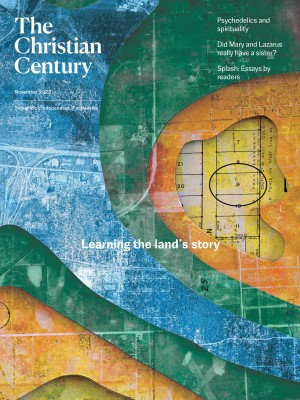
(Illustration by Jamiel Law)
I can’t remember exactly when it was, but I do know that the first time I heard Julien Baker sing it was live, in one of those medium-sized concert halls in Brooklyn where I spent many of the best nights of my 20s. It was 2016, I was a year out of college, and I’m pretty sure I was there with my roommate Celia, who had an extra ticket. The opener was something loud, unrestrained, boppy, and I wasn’t totally sure what to expect when Baker stepped out onstage with her rainbow-strapped guitar.
A lot of profiles of Baker emphasize her diminutive size and her relative youth, in part because it serves to underscore the absolute miracle that is her sound. So here: Baker is small, five-foot-nothing, but her voice is so, so big. She is young, just 21 years old that night, but her voice contains years of experience: it is achingly tender, terribly sad, plaintive on the edge of raw. Another thing that profiles do is talk about her audiences. It’s like church, they might say. Hundreds of people, hushed and hanging on her every word, faces turned up to the stage. They’re not wrong.
Read our latest issue or browse back issues.
I want to tell you what everyone else says a Julien Baker show is like so you’ll have an idea, so you can imagine yourself there in these church crowds, so you can see someone who is performing like she’s on the edge of the high dive. I love having the excuse and the proof of everyone else, because to tell you what listening to Julien Baker is like for me would be like letting you into a quiet, small part of myself that shies away from the light.
The first song Baker played into that reverently quiet Brooklyn concert venue, “Blacktop,” was about trying, in some ways, to outrun God—only to be caught up again and again in mercy you don’t know how to accept. I don’t know how to tell you that each of the songs that unspooled after that one felt like it was charting some unspoken corner of my relationship to the Divine, the horror and the heartbreak of believing in a sometimes frustratingly silent God who knows every horrible thing about you but who nevertheless extends grace and mercy toward you. You can draw a straight line between Baker’s describing herself as a “pile of filthy wreckage” and St. Teresa of Ávila calling herself a “foul and stinking dungheap,” Baker’s overwhelm at the love of God of a piece with the mystics who sobbed at the sight of the cross. And while the ideas in her songs are as old as Christianity itself, there’s something about them being written in my own vernacular that makes them come alive and hurtling toward my heart.
Part of me wants to dedicate the rest of this column to pulling out threads in each of her songs and holding them up to be examined, to lead you through an annotated playlist of my favorites, to point out the lines that made me cry or made me want to write entire essays dedicated to unpacking their theology, but I actually think the best way to encounter Julien Baker’s music, barring a concert venue in Brooklyn, is to do what I did for weeks afterward: listen to her music on your own, in a quiet room, eyes closed.
I will steer you to one moment though, that comes at the end of her first record, Sprained Ankle. The record contains a feature no live show ever could. It ends with Baker meditatively, almost absentmindedly picking out the notes to “In Christ Alone” on a piano. Suddenly, faintly but certainly, we hear the cadences of what can only be a good, old-fashioned southern radio evangelist, preaching with a cadence like hammer blows, crackling in and out of audible range. In a later interview, Baker mentioned that this was an accident—some piece of recording studio equipment had reached up into the airwaves, snagged this bit of audio, and set it down alongside Baker’s hymn.
In her book Vesper Flights, Helen Macdonald writes about an old cassette tape she listened to during those times in her messy, awful, early 20s when she wanted to feel closer to a God she didn’t quite believe in. She calls this an object of the “numinous ordinary.” In many ways, it was ordinary: a cassette taped from a Japanese radio show of Leonard Bernstein conducting Sibelius’s Seventh Symphony. What made it numinous, however, was that it was recorded during an electrical storm, the forces of nature blowing past the limits of the equipment it was recorded on. “It felt as if God had put thumbprints on the tape,” Macdonald writes. She writes of it years after the last time she listened to it as an object nearly scalding with the Divine.
I have always loved the phrase “god haunted”—the idea of a ghost God showing up in unexpected corners and dark passageways, the horror and awe and wonder of being confronted with the Divine, over and over and over again. I have flipped through enough radio stations on endless car trips to know how thoroughly God haunts the airways through the voices of radio pastors, and I have lived through enough summer storms to know that cracks of thunder and lightning always feel divine in provenance. And yet, when God comes down to haunt you in this way, it feels just as it should: personal, providential, and awe-inspiring. The size of the world, and your own insignificance, and here God is, putting on a show just for you. How wonderful, how horrifying.






